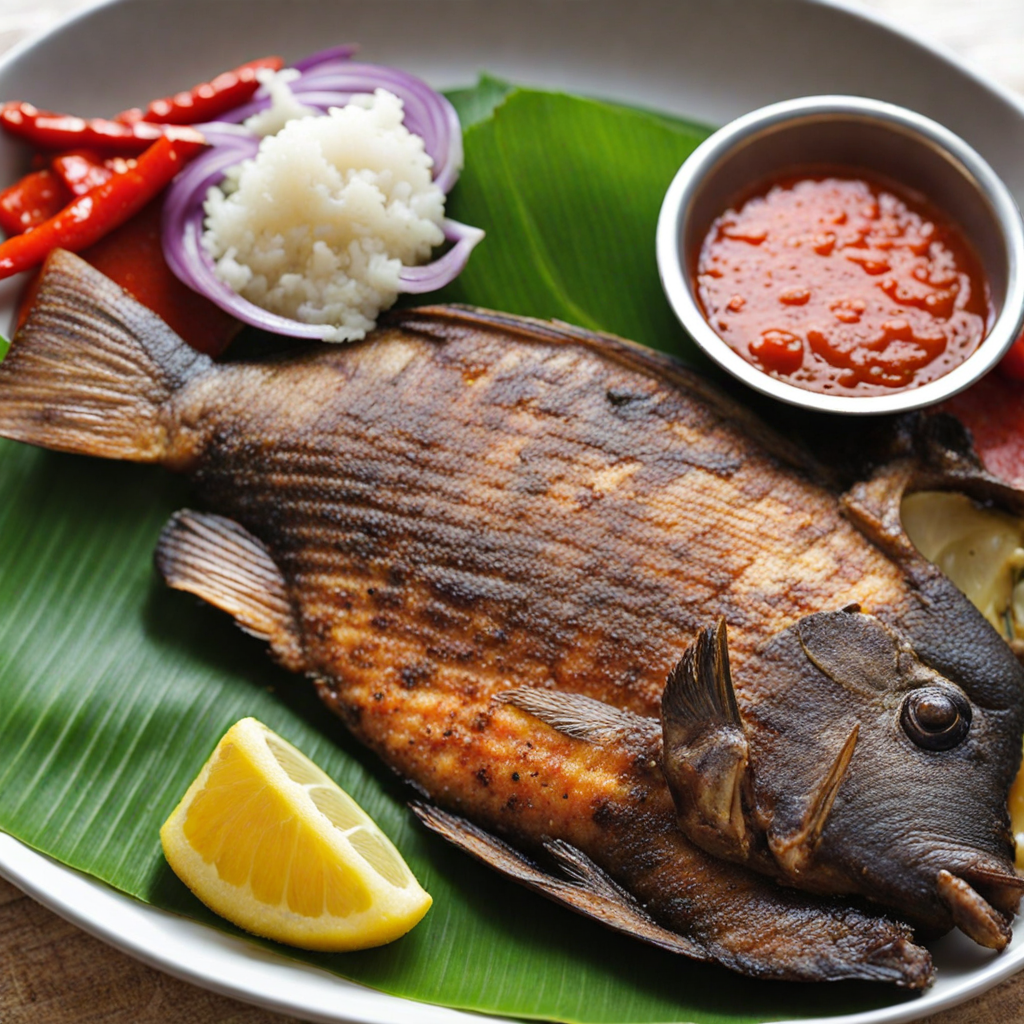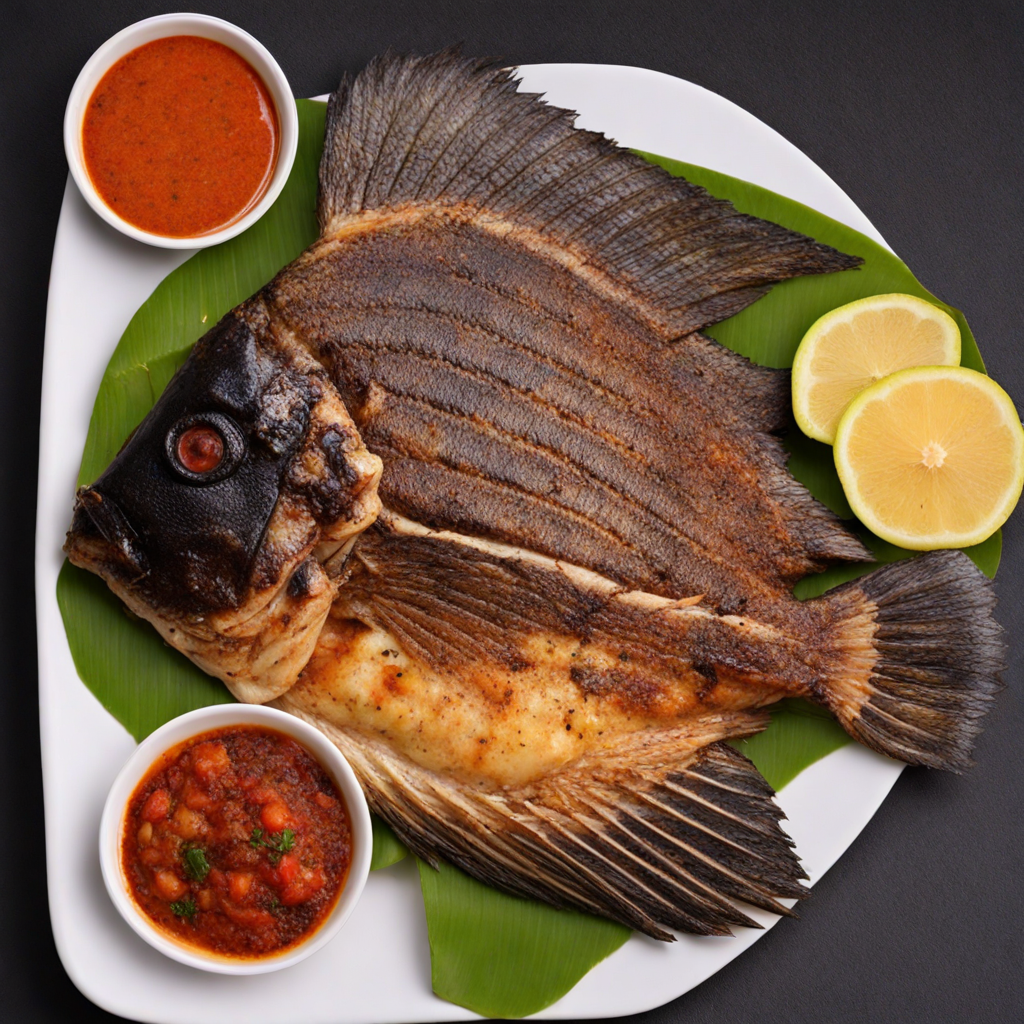Grilled Tilapia
Grilled Tilapia, a cherished dish in Ghana, showcases the country's vibrant culinary heritage. The tilapia, a freshwater fish, is known for its mild flavor and flaky texture, making it an excellent choice for grilling. The fish is typically marinated in a blend of local spices, including ginger, garlic, and chili peppers, which infuse it with a rich, zesty flavor profile. Often, a touch of lime or lemon juice is added to enhance its freshness, while a drizzle of palm oil lends a distinctive richness that complements the fish beautifully. Once marinated, the tilapia is grilled to perfection over open flames, allowing the skin to crisp up while keeping the flesh tender and juicy. The smoky aroma that wafts through the air is irresistible, enticing anyone nearby to indulge in this delicious seafood delight. Served with a side of spicy pepper sauce, known as 'shito,' and a generous helping of fried plantains or jollof rice, grilled tilapia becomes not just a meal but a true culinary experience that speaks to the heart of Ghanaian culture. Grilled Tilapia is more than just a dish; it's a celebration of flavors and traditions. Often enjoyed at family gatherings, street food stalls, or seaside restaurants, this dish is a staple that brings people together. The combination of the fish's succulent meat, the bold spices, and the accompanying sides creates a symphony of tastes that will surely leave a lasting impression on your palate. Whether you're a seafood lover or a culinary adventurer, Grilled Tilapia from Ghana promises to be a delightful discovery that transports you straight to the vibrant shores of West Africa.
How It Became This Dish
The History of Grilled Tilapia in Ghana Grilled tilapia is not just a dish in Ghana; it is a culinary tradition steeped in cultural significance, local customs, and historical evolution. As one of the most popular fish dishes in the country, grilled tilapia has found its way into the hearts and stomachs of Ghanaians, symbolizing a rich heritage and a connection to the land and water. #### Origins of Tilapia in Ghana Tilapia, a freshwater fish belonging to the Cichlidae family, is native to Africa and the Middle East. It thrives in various aquatic environments, including rivers, lakes, and ponds. In Ghana, tilapia is predominantly found in Lake Volta, one of the largest man-made lakes in the world, and the coastal waters along the Atlantic Ocean. The fish's adaptability and rapid reproduction made it a staple in the diets of many communities, particularly among those living near water bodies. The consumption of tilapia in Ghana can be traced back to ancient times when fishing was not only a means of sustenance but also a communal activity that fostered social bonds. Traditional fishing methods, including the use of nets and traps, were practiced by local fishermen, and the catch was often shared among families and neighbors. This laid the foundation for a culture where fish, particularly tilapia, was revered as a vital food source. #### Cultural Significance In Ghanaian culture, food goes beyond mere nutrition; it is an expression of identity, community, and heritage. Grilled tilapia has become synonymous with communal gatherings, celebrations, and special occasions. It is a dish that brings people together, often enjoyed during family reunions, weddings, and festivals. The act of grilling tilapia is as important as the dish itself, serving as a social activity that fosters connection and interaction among friends and family. The preparation of grilled tilapia often involves marinating the fish in a blend of local spices, including ginger, garlic, pepper, and herbs. This marinade is deeply embedded in Ghanaian culinary traditions, highlighting the use of natural flavors to enhance the taste of the fish. The grilling process, typically done over an open flame or charcoal grill, imparts a distinct smoky flavor that has become a defining characteristic of the dish. Additionally, grilled tilapia is often served with a variety of side dishes, such as spicy pepper sauce (shito), fried plantains, or jollof rice, creating a harmonious blend of flavors that reflect Ghana's diverse culinary landscape. This combination of aromas and tastes is a celebration of local ingredients and cooking methods, showcasing the country's agricultural bounty. #### Development Over Time As Ghanaian society evolved, so did the methods of preparing and consuming grilled tilapia. The advent of modern fishing techniques and aquaculture has transformed the availability of tilapia, making it more accessible to urban populations. With the rise of fish farming in Ghana, tilapia has become a significant source of income for many farmers, ensuring a steady supply of this beloved fish. By the late 20th century, grilled tilapia had gained popularity beyond local communities. Street vendors began to emerge, serving grilled tilapia to busy urban dwellers and travelers. These vendors brought the dish to a wider audience, introducing creative variations and innovative serving styles. Grilled tilapia became a staple in street food culture, reflecting the dynamic interplay between tradition and modernity. Furthermore, the globalization of food culture has influenced the way grilled tilapia is perceived and enjoyed. As Ghanaians traveled abroad, they took their culinary traditions with them, introducing grilled tilapia to international audiences. This cross-cultural exchange has led to the incorporation of different cooking techniques and flavor profiles, enriching the dish while preserving its essence. #### Contemporary Relevance In contemporary Ghana, grilled tilapia holds a prominent place in both everyday meals and festive occasions. It is often featured in restaurants, food festivals, and street food markets, attracting locals and tourists alike. The dish has also gained recognition on social media platforms, where food enthusiasts share their experiences and recipes, further popularizing grilled tilapia as a must-try culinary delight. Moreover, the growth of the tourism industry in Ghana has elevated the status of grilled tilapia. Tourists seeking authentic culinary experiences are drawn to local eateries and street vendors offering the dish, contributing to its recognition as a symbol of Ghanaian cuisine. Culinary tours often include opportunities to learn about the fishing process, traditional grilling methods, and the significance of tilapia in Ghanaian culture. #### Challenges and Sustainability Despite its popularity, the grilled tilapia industry in Ghana faces challenges, particularly concerning sustainability. Overfishing and environmental degradation threaten the natural habitats of tilapia, prompting concerns about the future of fish stocks. To combat this, various organizations are advocating for sustainable fishing practices and responsible aquaculture, ensuring that future generations can continue to enjoy grilled tilapia without compromising the health of aquatic ecosystems. The promotion of local sourcing of ingredients has also gained traction, with initiatives encouraging farmers and fishermen to collaborate in a way that supports both communities. This sustainable approach not only preserves the cultural significance of grilled tilapia but also fosters economic resilience in local fishing communities. #### Conclusion Grilled tilapia in Ghana is more than just a popular dish; it embodies a rich tapestry of history, culture, and community. From its ancient origins in the waters of Lake Volta to its contemporary status as a beloved street food, grilled tilapia has evolved while remaining deeply rooted in Ghanaian traditions. As the country continues to navigate challenges in sustainability and globalization, the enduring appeal of grilled tilapia serves as a testament to the resilience and adaptability of Ghanaian culinary heritage. This dish, with its flavorful profile and cultural significance, will undoubtedly continue to thrive, celebrating the connection between people, food, and the environment for generations to come.
You may like
Discover local flavors from Ghana







